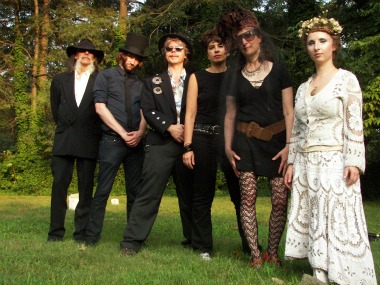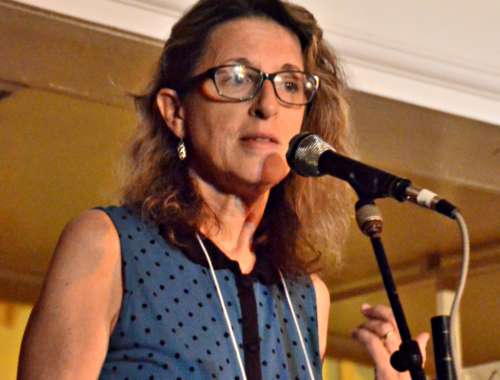
Sylvia Platypus, from left, Bill Barone, Michael Southerton, Charlie Rutan, Rosealba Gallo, Janet Bressler, and Ruchama Bilenky.
If it hadn’t been for an intriguing ad on Craig’s List, the indie group Sylvia Platypus might not have been a Celtic band.
The ad that band founder, Cheltenham’s Janet Bressler, saw was from a professional bagpiper named Charlie Rutan.
Rutan is well known in bagpipe circles—and beyond. He owns and operates Bagpipes FAO (for all occasions) and has piped for everyone from President George H.W. Bush to Rod Stewart. He’s played at the Smithsonian, as principal bagpipe of the Reading Symphony Orchestra, on the John DeBella Show, and, of course, for countless funerals.
“Basically, the ad said that he was looking for gigs where he wasn’t wearing a kilt and playing bagpipes standing in a cemetery,” explained Bressler, a tiny, stylish woman who was wearing feather earrings, a stingy brim fedora, and an artfully ripped blazer when we met recently at a Starbucks in Flourtown.
Bressler, who has founded half a dozen other musical chemistry projects over the years, was looking for someone to replace a musician who didn’t work out.
“It was a 400 pound baritone sax player,” said lead guitar player Bill Barone, who contributes some historical chops to the group (he was once the guitarist and only American in the ‘70s symphonic “krautrock” and cult band, Wallenstein). “He didn’t weigh 400 pounds,” scolded Bressler. Barone, sporting a Grateful Dead t-shirt that he probably didn’t buy as “vintage,” paid no attention. “We didn’t think he would fit on stage,” he added, chuckling.
Enter Rutan, who is considerably smaller. “This all came about from one St. Patrick’s Day, I was asked to come on the John DeBella show on WMGK because they wanted to run a contest to see who could identify rock songs played on the bagpipe,” explains Rutan. “So I spent a lot of time learning a lot of rock songs. Then I thought, why waste all this effort. It was another way to be creative and I wanted to see where I could go with it. So I put some tentacles out there.”
Tentacles, as in Craig’s List. Now, Sylvia Platypus is on Rutan’s resume and this oddly named group, which is not a Sylvia Plath tribute band (“I was looking for something literary,” explains Bressler. “When people ask me about it, I just say it’s a duck-billed suicide”), can bill itself as a psycho-celtic glam-blues band. And as their recently released EP illustrates, that’s a pretty accurate chain of adjectives.
“Like a Vampire,” sung with earthy fullness by Bressler, who has been likened to Edith Piaf, is rock at its best, with some hot guitar from Barone with a surprisingly delicate underpinning of bagpipes from Rutan. Then, they set rock on its ear with their cover of the Stones’ “Paint it Black,” where Rutan’s pipes take center stage. “Raggle Taggle Gypsy,” a standard for Celtic bands, is re-imagined wildly and with passion by Bressler’s raw vocals. And there’s the haunting “The Seagull (An Faoileag), my back button favorite, which sounds traditional but was written by Bressler and Rutan, who now write many of SP’s songs together. (Several have been picked up by a company that markets music to movies and TV shows.)
Only two years old, Sylvia Platypus have already brought its rock opera, “LeMirage/Dead City Philly” to the Philly Fringe Festival and will be doing a reprise on February 2 at The Rotunda at 40th and Walnut in Philadelphia. Bressler penned the whole thing, which is based in part on Georges Rodenbach’s 1892 novella “Bruges La Morte.” Members of the band—bass player Ruchama Bilenky, founder of the DysFUNctional Theatre Company (and Bressler’s daughter) and Michael Southerton, an English and drama teacher at South Philadelphia High and founder of the band Song Dogs and the Night Jar—both act and play, while the band plays the role of Greek chorus in this multi-media show.
They’ve also appeared twice at World Café Live and at the Tin Angel, a notoriously difficult gig to get in the city.
Bressler gives credit for their early success to her years in the business and the musicianship of her band, which also includes noted drummer Rosealba Gallo, who also plays with a group called The Non-Domestiks. Although the pipes were initially a hard sell, “we all hit it off musically,” says Rutan, who plays nine different pipes, including the rare Italian double chantered zampogna pipes. (“There are only a few in the country and mine are the only ones that are working,” he jokes.)
Barone agrees that “there’s a real chemistry of musicianship. There’s a desire to make everything work together so that everyone fits in and no one steps on anyone else.”
He also credits Bressler, with whom he’s worked in bands before, for giving the SP both its solid musical underpinnings and its charisma and glam on stage . “She’s the classic rock front person,” he says. “Her stage presence is incredible. People just can’t take their eyes off Janet. It makes it easier for us. For me, I’m more up there to be heard than seen. Plus, she writes great stuff. Fortunately, she writes like crab grass grows.”
Barone, whose stint in Germany with Wallenstein (“the ancestor of ‘Yes’” is how Rutan describes them) earned him a place in a Wikipedia entry and some interesting spots on YouTube , almost abandoned the business. He hadn’t done music fulltime for years (he’s retiring soon from his job as heavy equipment mechanic at Giles and Ransom) then re-whetted his appetite with the cover band Classic Jurassic in 2008 (he is proudly 60, so doesn’t actually remember dinosaurs). Bressler found him again a couple of years ago and drafted him into Sylvia Platypus.
“I had pretty much sworn off,” he admits. “She”—he nods towards Bressler—“got me back in and I’m focusing on the music fulltime.” And behind the graying ‘stache and beard, Bill Barone looked pretty happy about that.

